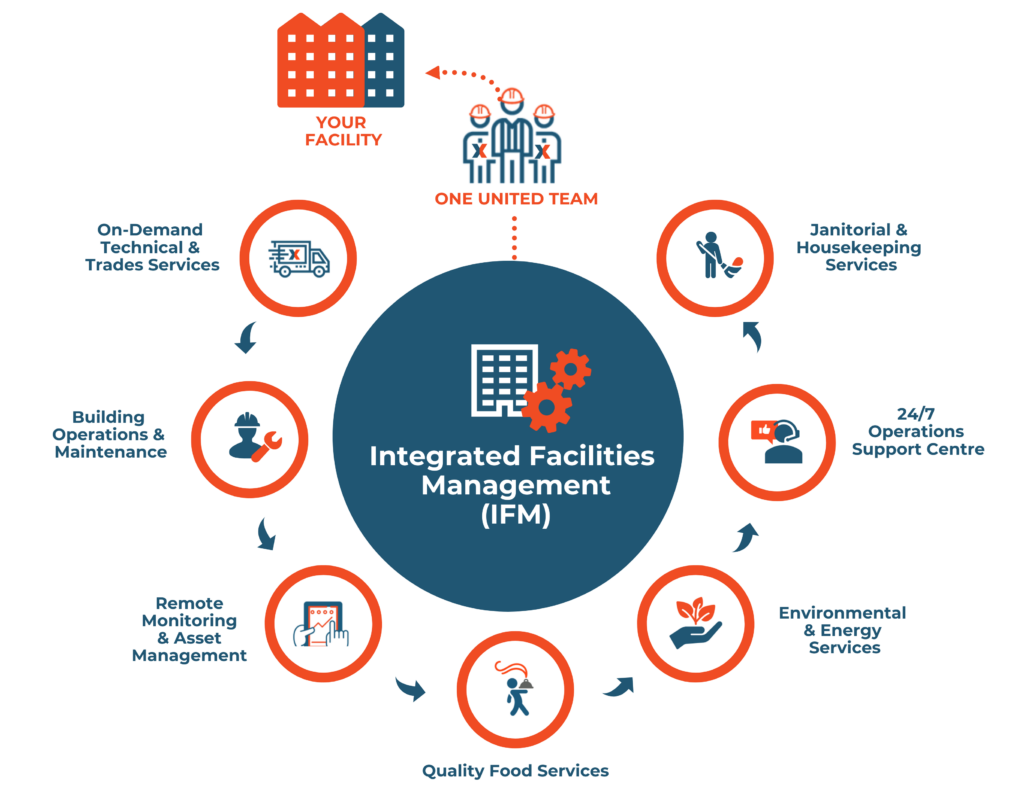Key Trends Forming the Future of Center Management in 2024
As we look ahead to 2024, the landscape of facility monitoring is positioned for considerable transformation, driven by several vital patterns. The integration of clever structure technologies and a change in the direction of data-driven decision-making guarantee to boost functional efficiency while focusing on sustainability in method.
Smart Structure Technologies

Smart building technologies include a wide range of systems, consisting of smart lights, HVAC controls, and safety and security systems. By integrating these systems, facility supervisors can monitor and adjust parameters in real-time, resulting in considerable reductions in energy waste and operational costs. Wise sensors can discover occupancy levels and readjust lights and temperature level appropriately, guaranteeing that energy is just made use of when needed.
Furthermore, these technologies facilitate boosted information collection, enabling organizations to track use patterns and determine opportunities for further renovations. The execution of wise building modern technologies not just contributes to sustainability objectives however likewise creates much healthier work environments that can enhance worker productivity and satisfaction.
As we relocate into 2024, the fostering of clever structure technologies will likely speed up, reflecting a more comprehensive shift in the direction of more smart, responsive, and lasting facility monitoring methods.
Data-Driven Choice Making
Progressively, organizations are leveraging data-driven choice making to enhance center management methods. By utilizing information analytics, facility supervisors can acquire actionable understandings that considerably improve operational performance and resource allotment. The combination of innovative innovations, such as IoT sensing units and real-time tracking systems, makes it possible for the collection of large quantities of data on building efficiency, tenancy rates, and energy intake.
This wealth of info permits center managers to determine fads, forecast maintenance requirements, and proactively address concerns prior to they escalate. As an example, anticipating analytics can forecast devices failings, reducing downtime and repair work expenses. Additionally, data visualization tools assist in far better interaction amongst stakeholders, guaranteeing that notified decisions are made collaboratively.
Additionally, data-driven strategies boost strategic planning by enabling facility managers to assess the effectiveness of current practices and make informed choices concerning investments in innovation or facilities. As companies progressively prioritize operational excellence, data-driven decision production is positioned to come to be a keystone of effective facility administration techniques in 2024 and beyond. Ultimately, the ability to utilize information successfully will equip organizations to create more reliable, effective, and resistant facilities.
Sustainability and Eco-friendly Practices
The emphasis on data-driven choice making normally straightens with the growing focus on sustainability and green techniques within center administration. As organizations increasingly focus on environmental responsibility, center supervisors are leveraging analytics to optimize source usage, decrease waste, and decrease carbon impacts. This tactical approach makes it possible for the combination of energy-efficient systems, such as LED lighting, clever a/c controls, and sustainable energy resources into center operations.
Moreover, the application of sustainable techniques prolongs past energy intake. Facility supervisors are advertising and embracing green materials reusing efforts to create a circular economy within their facilities. This not just enhances the ecological profile of the additional hints company but likewise cultivates a culture of sustainability amongst employees.
Conformity with ecological guidelines is another critical element driving the fostering of green methods. By making use of data analytics, facility supervisors can keep track of compliance metrics and recognize locations for improvement, making sure adherence to worldwide and neighborhood sustainability standards.
Hybrid Work Versions
A substantial shift towards hybrid job versions is improving the landscape of facility administration in 2024. This standard incorporates in-office and remote job, demanding a reevaluation of space utilization, source appropriation, and employee engagement techniques. Organizations are significantly identifying the relevance of flexible workspaces that satisfy diverse requirements and preferences.
Center managers have to adapt by applying flexible workplace designs that sustain collaborative efforts while giving areas for concentrated job. This includes the assimilation of check this innovation to promote seamless interaction and collaboration among in-office and remote employees. Smart building remedies, equipped with sensors and analytics, permit real-time tracking of area use, enabling organizations to maximize their settings efficiently.
Additionally, crossbreed job models highlight the requirement for reliable center management that prioritizes Check This Out worker experience. This incorporates not just technology and space style however additionally the growth of plans that promote a balanced work-life dynamic. As companies navigate this shift, the function of center monitoring comes to be pivotal in creating an agile workplace that promotes efficiency and drives business success. Basically, the crossbreed job version is changing center monitoring, urging an aggressive approach to meet the evolving needs of the labor force.
Improved Passenger Wellness
As organizations welcome hybrid job models, a heightened concentrate on passenger wellness is coming to be indispensable to facility management approaches. Facility Management. This change acknowledges that a pleased and healthy labor force directly influences efficiency and retention rates. Center managers are currently prioritizing settings that advertise physical and psychological well-being, incorporating aspects such as all-natural illumination, biophilic design, and easily accessible wellness resources

Innovation plays a vital duty in this advancement. Smart structure systems can keep an eye on ecological aspects and change settings in real-time, guaranteeing optimal convenience degrees - Facility Management. Moreover, comments systems, such as occupancy sensors and employee surveys, enable facility supervisors to continuously refine wellness campaigns based upon owner demands.

Conclusion
In 2024, the future of center management will certainly be significantly influenced by the assimilation of smart building modern technologies and data-driven decision-making, fostering enhanced functional performance. Sustainability efforts will focus on eco-friendly practices, while the introduction of crossbreed work models will require adaptable workplace designs. Additionally, an enhanced concentrate on occupant wellness through sophisticated cooling and heating systems and biophilic layout will contribute to healthier workplace. These trends collectively underscore the developing landscape of facility management in reaction to contemporary challenges and opportunities.
Facility managers are promoting and taking on environment-friendly products reusing campaigns to develop a round economy within their facilities.A significant change towards hybrid job designs is reshaping the landscape of center administration in 2024.Furthermore, crossbreed job models stress the requirement for effective center administration that focuses on worker experience.As organizations welcome hybrid work versions, an increased emphasis on passenger wellness is coming to be essential to center administration strategies.In 2024, the future of center management will certainly be considerably affected by the integration of clever building modern technologies and data-driven decision-making, fostering boosted operational effectiveness.